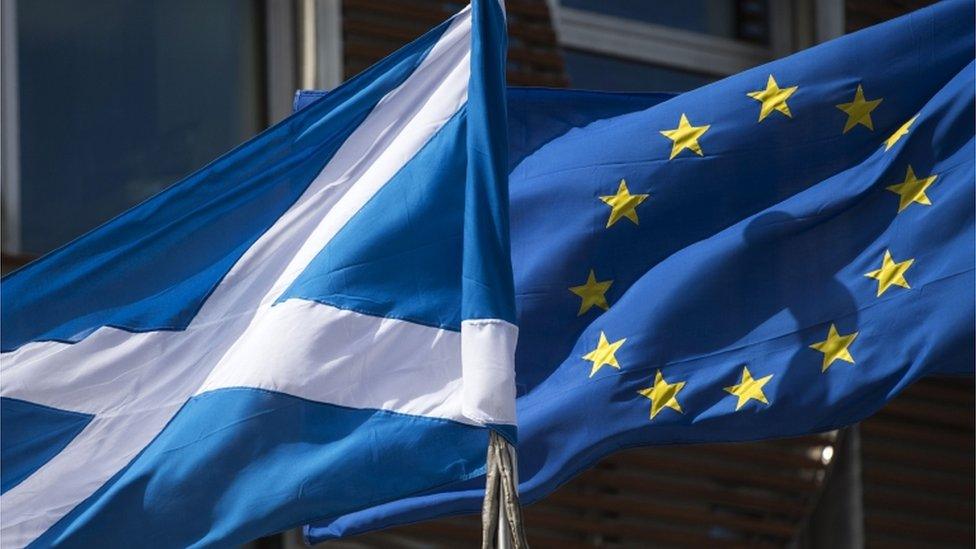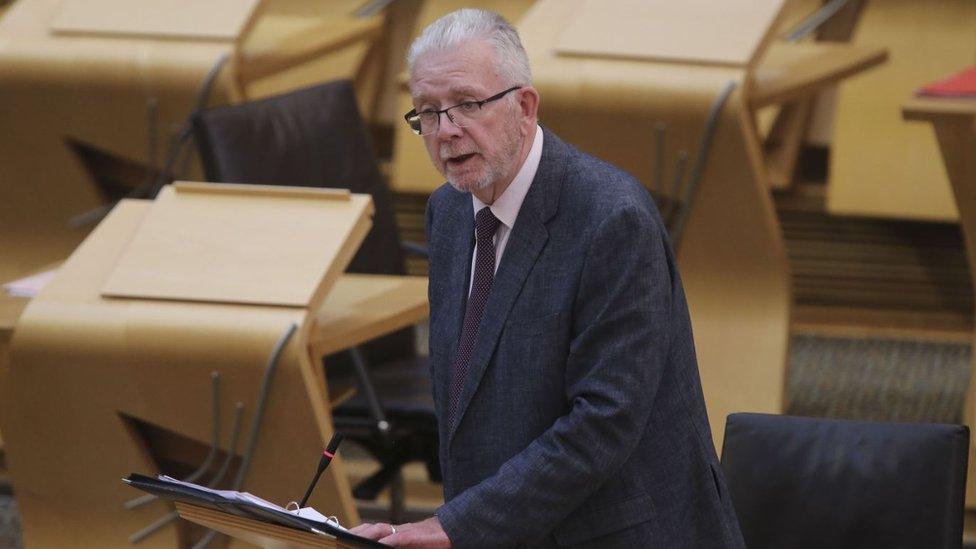Brexit: MSPs vote to reject UK internal market bill
- Published

MSPs have voted not to consent to the UK government's legislation to set up an "internal market" after Brexit.
The Internal Market Bill is making its way through the Commons, but has led to rows with the devolved administrations.
Constitution Secretary Mike Russell said the bill would "fundamentally undermine" the Scottish Parliament.
However, the Scottish Tories argued that the legislation will protect jobs and deliver "significant" new powers.
MSPs voted by 90 to 28 to say that parliament "agrees not to consent" to the UK legislation as it "constrains the competence of the Scottish Parliament and breaches international law". Only the Conservatives voted against the motion.
The Scottish government argues that Holyrood's consent is required under the Sewel Convention - which says the UK government will normally consult devolved bodies before passing a law that affects powers they exercise.
However, the last time MSPs voted to refuse consent - over the EU Withdrawal Act - the Supreme Court ruled that while Sewel was important, it was a convention only, and could not be policed by the court.
Cabinet Office minister Michael Gove has already indicated that the UK government will press ahead with the legislation even without devolved consent, saying that "leaving the EU is not a normal occurrence, it is an exceptional one".
The UK government has clashed with the EU over provisions in the Internal Market Bill which ministers admit would "break international law" by overriding parts of the Brexit withdrawal agreement.
They are also locked in dispute with the devolved administrations over what the legislation could mean for trade and regulations across Scotland, England, Wales and Northern Ireland from January 2021.
The proposed system of "mutual recognition" would see each administration set standards and regulations locally, but they would still have to accept goods from all other parts of the UK.
The UK government say this is important to make sure there is still a free flow of goods and services across the UK, but the devolved administrations say it could spark a "race to the bottom".

Mike Russell said it was "nonsense on stilts" to suggest the bill would protect jobs
The parliament's constitution committee recommended MSPs reject the bill, with the exception of the three Tory members, with MSPs from all other parties saying they were "dismayed" by the UK government's approach.
Mr Russell told MSPs that the bill would "take a wrecking ball to Scotland's parliament and democracy" and would place a "blanket constraint" on Holyrood's powers.
He said the proposed system was a recipe for "regulatory incoherence and a race to the bottom" and would "require Scotland to accept lower standards for food, environmental standards and building standards".
The minister also said it was "nonsense on stilts" to suggest the bill would protect jobs, or that it would see extra powers come to Holyrood.
He added: "This bill is wholly unacceptable and should be rejected."
'Constitutional scaremongering'
For the Scottish Tories, Dean Lockhart said there were "legitimate questions" about the detail of how the plans would work, but said there was "too much focus on constitutional scaremongering and hypothetical concerns" which were "completely untrue".
The MSP said trade with the rest of the UK was "more important than the EU market and the rest of the world put together" for the Scottish economy.
He said: "Surely the priority when further restrictions have just been announced on the economic activity must be to protect the 550,000 jobs and 60% of trade that relies on barrier free access to the internal market."
Scottish Labour's Alex Rowley said bill was a "full on attack on the existing devolution settlement", saying "we will not give support to any measures that reduce and constrain the competence of the Scottish Parliament".
He said: "The greatest threat to the future of Scotland, its economy and its relationship with the rest of the UK is Boris Johnson and all the Scottish Tories who have lined up behind him in blind loyalty."
Scottish Green co-leader Patrick Harvie hit out at "an extraordinary bill which poses an extraordinary threat to us all", and said if the UK government pushed ahead without consent it would make the case for a second independence referendum "unanswerable".
Meanwhile Lib Dem leader Willie Rennie said the bill "exists to smooth a trade deal with the US" and would "sweep away objections from devolved administrations on matters like food safety and environmental safety".
Secretary of State for Scotland Alister Jack said the vote was disappointing as the internal market bill was in the "best interests of people across Scotland"
"The UK government has acted decisively to safeguard seamless trade between Scotland, England, Wales and Northern Ireland, which 60 percent of Scotland's exports depend upon," he said.
Scotland's Constitution Secretary Michael Russell called on the UK government to withdraw the legislation.
"The Scottish Parliament has overwhelmingly backed this government's rejection of the bill. Now we urge the UK government, once again, to abandon this deeply damaging bill," he said.